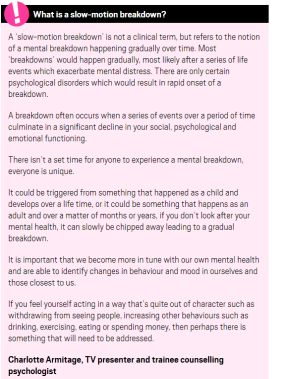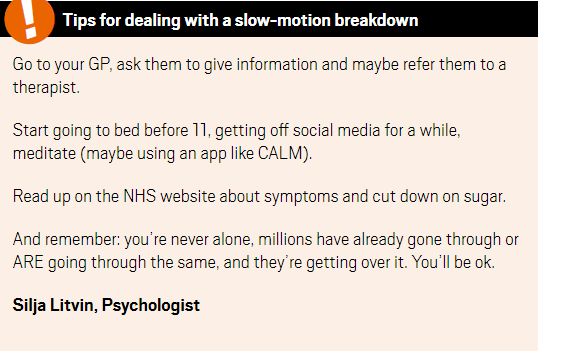
How do you know if you’re having a slow-motion breakdown?
We tend to think of mental breakdowns as huge, cataclysmic moments that change our lives in the blink of an eye.
One day you’re working hard, coping with the stressors of life, the next you find yourself sobbing uncontrollably in the office, or completely unable to get out of bed or dress yourself.
But mental breakdowns are not always these dramatic, rapid events where your world instantaneously falls down around you.
Sometimes breakdowns creep up on you, incrementally, for weeks, months or years – it can be hard to even notice it is happening and incredibly difficult to dig yourself out once it starts.
The phenomenon can be known as a slow-motion or slow developing breakdown and they are surprisingly common.
We live in a world where being busy is the norm, we don’t often have time to take stock of our emotions and pushing through discomfort is just part of our day-to-day existence.
But when it comes to your mental health, this non-stop mentality can be enormously damaging and can trigger a gradual descent into serious mental illness.
So how do you know if it’s happening to you?
How do you differentiate between normal stress and symptoms that signify the beginnings of a breakdown?
Former Sky Sports TV presenter and interior designer Cat Raincock experienced a slo-mo breakdown.
She says becoming a mother is what started everything – but it took years for her to figure out what was really going on.
‘Following the birth of my first child, life became difficult to manage – I had a perfectly manicured life prior to introducing my child to the world,’ Cat tells Metro.co.uk.
‘I strove for perfection in everything I did, the way I looked and the perception I put out to the world.
‘Add a child to the mix and that all changed – it was like a tsunami of overwhelming feelings at the magnitude of the job I had ahead and the responsibility I now had to this child.
‘Trouble was, I still felt like a child myself so how was I going to manage a baby when I feel like an overwhelmed little girl?
Advertisement

How could I, the woman who needed to be perfect, make motherhood look effortless and easy?
‘Motherhood bought up my control issues, I was obsessed with routine and was constantly busying myself to avoid the barrage of feelings that were coming up.
My nervous system was on high alert every second of the day.
‘My meltdown was spread over around two years.
Because it wasn’t one big catalytic moment, I didn’t see it coming.’
For Cat, her breakdown symptoms manifested as everyday stresses.
But the accumulative effect of operating with perpetually frazzled nerves were catastrophic.
‘I would find drama and stress in most situations – packing to go on holiday felt like the biggest effort, airport travel was overwhelming, two kids in busy places with lots of noise would send my nervous system in to meltdown and wine o’clock always seemed like the only solution to numb the feelings and ignore the signs.
‘It was one day when my husband turned around to me and asked me if I was happy.
I responded, “of course I am, I’m a busy mum and got tons to do.”
But he suggested there was more to my “stress” than met the eye and recommended I get help.
‘We have a notion in society that unless you’re having a mega breakdown that nothing is wrong, but we are normalising the low hum of everyday chaos with wine, social media reliance, gossip, blame, being busy and even work.
‘The drive to numb the feelings through these everyday addictions is the warning sign that there is something afoot.
Most of us are used to just saying, “I’m fine”, when actually there is work to be done and ways to improve our emotional and physical health.
‘Had I not had a child, there is no doubt the meltdown would have manifested later on in life, but the trigger would have been different.
They say that birth, death, divorce and even moving house can be the trigger to send you over the edge.
‘I was heading for the nervous breakdown for sure. Motherhood forced me to let go of perfection and control – there is no controlling life with a little one in tow, you have to go with the flow, but when you are obsessed with routine in a bid to feel safe, that’s a tall ask.
‘Motherhood was my trigger, but not the cause of my slow meltdown.
The cause was my early childhood programming and acquisition of limiting beliefs of not feeling enough or ultimately good enough.’
Cat’s saviour was reaching out to get help.

Professional assistance, coupled with a conscious effort to slow the pace of her life helped her come through the other side. ‘Don’t try to do it on your own.
Seek help in a coach, a mentor or even a book or online programme.
Be kind to yourself and stop the drive to be everything to everyone all the time, give yourself a break.
Start slowing, explore meditation, yoga and being in nature – find ways to slow down – we need this in our go-go-go society.
‘And remember, you are good enough as you are and if this is the only mantra you remind yourself of every single day, then that’s a start.’
In 2005, Philip, a senior officer in the army, was dealing with the messy collapse of his marriage, the pressures of a harrowing tour in Iraq and fears for his dad who almost died after having a stroke.
He didn’t realise it at the time, but he was at the beginning of a slow developing breakdown, which would take him years to recover from.
‘The pressures on life were immense at that time – but being a senior officer I put a front on – a bluff so good that many of my friends and colleagues didn’t realise what was going on,’ Philip tells Metro.co.uk.
‘I just knew my moods were very up and down and when they got down, suicidal thoughts took over almost everything I was thinking about.
‘Over time, my down periods became longer than my up periods, as the legal battle over my divorce became more intense my behaviour would become more and more risky; drinking too much, not sleeping, running away from relationships, isolating myself and my ability to put a “normal” front on was tested to the extreme.
‘Eventually, when I couldn’t shake the suicidal tendencies, I went to my GP and was referred to a psychiatric unit for assessment where I was diagnosed with stress-induced depression.
I don’t think there was any one time when I realised something was wrong, but I did know that “proper me” wasn’t there, and that worried me.’
Philip’s breakdown took around 18 months to fully materialise, and many more years to properly diagnose.
He says that the gradual nature of this kind of illness can make it hard for people around you to realise that you need support.
‘The hardest thing for the sufferer is that you are the last to realise you are suffering,’ explains Philip.
‘You ignore the impact it has on those around you, on your career, on your loved ones, on your family, on your friends.
People slowly distance themselves from you, it is almost like they don’t want to catch it.
‘No one asked how I was or if I needed to talk – I think the slow development meant that people began to believe that was who I was.
‘Awareness is the key to people realising that it is OK to ask if someone is OK and it is OK to admit you are not OK – there should be no stigma attached as you can get treatment and you can get proper you back.
‘I was unlucky as my depression was masking an underlying severe PTSD caused by my time in Iraq, my psychiatrist never assessed me for that and I was treated with drugs for my depression.
Coming off those allowed the PTSD to come through and that took another fours years to be diagnosed and another year to be treated.
‘I am now out the other side, 15 years from the start of the conditions that led to my depression, breakdown and then PTSD, but I can now say I have proper Philip back.
‘I still have down times, but my loved ones know what to look for and they are my rocks.
The support I have had from the NHS has been outstanding and I know when things are slipping so I can sort it.’
Psychologist Silja Litvin says that building resilience is key to preventing a breakdown from progressing.
‘In psychology we would call this phenomenon a gradual decline of mental health over time, or the increase of pathological symptoms over time,’ Silja tells Metro.co.uk.
‘Everyone’s mental health is on a “sliding scale”.
Depending on a lot of external and internal factors, one’s position changes, and more symptoms manifest or worsen.
‘Continuous stress without a balance through coping skills, physical illness, lack of resilience, a pre-existing genetic disposition, life challenges, and an unhealthy lifestyle can be reasons this occurs.
‘Breakdowns can develop over days to weeks to months, depending on your resilience – people with high resilience can maintain halfway good health for longer, despite continuous stress. Poor sleep can speed things up, for example.
‘Look out for symptoms like: feelings of depression or anxiety that are new or more overwhelming than before, shutting down and being unable to participate in normal activities, missing appointments, work, school, and other responsibilities, being socially isolated and withdrawn, mood swings, decreased self-care, unexplained pains or gastrointestinal distress and getting sick more often or worse than usual.
‘Building resilience is key, it’s the single most powerful factor against developing a mental illness.
You can do that through psychoeducation, maintaining good sleep, working out, meditation, staying connected to your tribe, going to therapy and practicing gratitude.’
